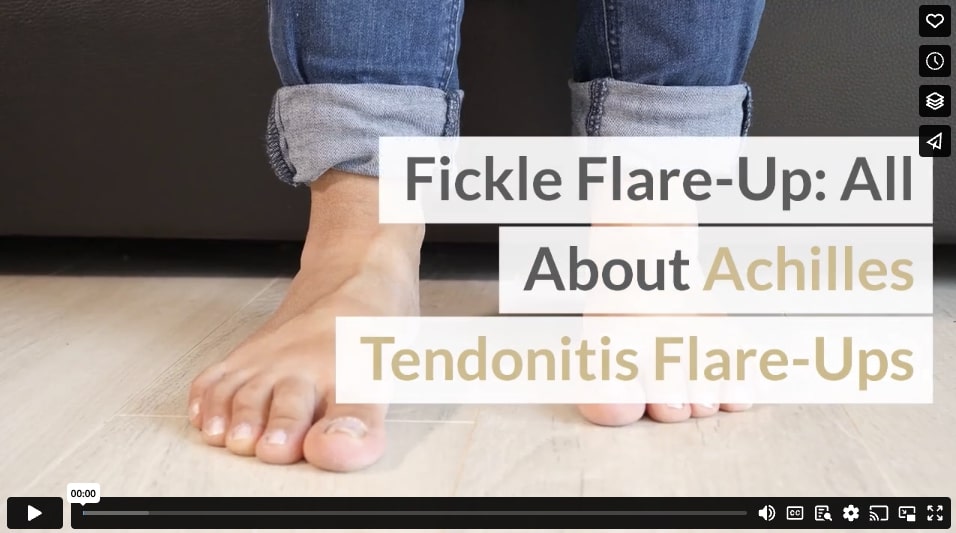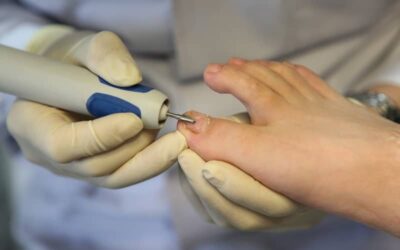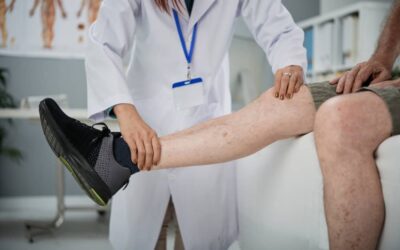If you are already on edge from a recent Achilles tendon injury, any pain you experience in the area can make you nervous. Have you injured the tendon again? Will your recovery be compromised? Have you damaged the tendon further?
Luckily, pain like this is most likely a flare-up. We’re here to help you learn everything you need to know about Achilles tendon flare-ups that may occur during your Achilles tendonitis treatment.
What is a flare-up?
Your knee-jerk reaction may be to assume you have re-injured your tendon, but that is probably not the case. A flare-up occurs when pain receptors in the area are more sensitive. The pain receptors fire off easily with even the most gentle of movements. More than likely, the amount of damage was not worsened by what you were doing.
Even though you may not have reinjured your tendon, these signals are your body’s way of warning you that you should take it easy. They are to keep you safe (and humble).
Why am I experiencing a flare-up?
Flare-ups can happen at any time. Some causes for flare-ups could include:
- Increasing activity intensity too much.
- Stretching too hard or too long.
- Increasing weight in exercises too much.
- Too many repetitions or sets of an exercise.
- Increasing volume of exercises performed at a time.
- Activity intensity from yesterday was too much.
Tendon pain doesn’t always occur exactly at the time that activity occurs; the flare-up can arrive up to a day after you overdo it.
Any increase in duration, intensity, volume, or frequency of exercise can trigger a flare-up of pain. The pain might not be proportionate to the change in activity; you may only increase exercise a small amount, but the pain may increase dramatically. This is especially true if the injury is still fresh.
What should I do now?
If you experience a flare-up, your body is simply asking you to slow down. The best course of action is to listen to it. Give your body extra time to recuperate.
Trying to push through a flare-up will cause more pain. It may not damage the tendon further, but it isn’t helping, either. Give your body the rest it is asking for.
When you are training for something specific, taking time away from your training can be discouraging. Your Achilles tendon specialist can help you come up with modified exercises you can do to keep in shape without causing further damage to your tendon. Your flare-up most likely did not cause more damage, but pushing through the pain and exercising at unsafe intensities could set you up for potential injuries.
If, however, you experience a sudden, sharp pain during exercise, it could possibly be a tear. If this is the case, visit your podiatrist as soon as possible for an evaluation.
How can I alleviate the pain?
To help with the pain, you will want to ice the afflicted Achilles. Over-the-counter pain medication (acetaminophen or Ibuprofen) can also be helpful. Choosing footwear that has a slight heel raise can help reduce the stress on and movement required from the Achilles tendon. Rest is also your friend when it comes to reducing Achilles tendonitis and flare-up pain.
Pain has some psychological factors, too. Stressing about the pain and your potential for re-injury becomes a self-fulfilling prophecy. The more you stress about the possibility of pain, the more pain you will experience. To stop stressing about it, do everything your podiatrist recommends to help your Achilles tendonitis heal. When you know you are doing your part, letting go of stress can be easier.
Should I stop exercising?
For the moment, choosing to stop exercising is wise. You can resume exercising the next day, but follow the rehab exercises provided by your podiatrist. If those also trigger flare-up episodes, modify them even more.
Listen to your body when it is communicating with you. Healing from Achilles tendonitis can be a long road. You will have the most success if you stay patient and follow the instructions from your Achilles tendon specialist.
How often will I have flare-ups?
The frequency of flare-ups can be influenced by a lot of outside factors, including:
- Exercise routine
- Sleep levels
- Lifestyle stressors
- Major events
- General health
Keeping your body in good general health, with adequate sleep, manageable stress levels, a healthy diet, and regular exercise, will leave your Achilles tendon feeling great (and probably the rest of you probably will feel great, too).
If you are concerned about flare-ups during your Achilles tendonitis healing journey, a podiatrist is always happy to help you.
Infographic
If you’ve recently suffered an Achilles tendon injury and are already on alert, any discomfort in the affected area can trigger anxiety. Questions about potential re-injury, compromised recovery, and additional damage to the tendon may arise. Fortunately, such pain is likely just a flare-up. We’re here to assist you in understanding all the essential information about Achilles tendon flare-ups that may arise during your treatment for Achilles tendonitis.

Video




